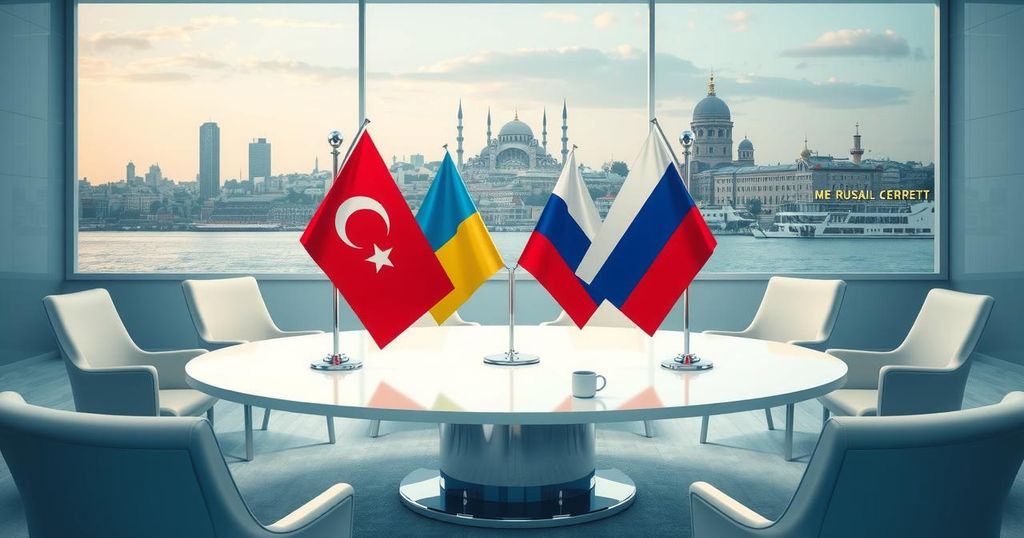Russia and Ukraine Set for Peace Talks in Turkey Amid Strained Relations
Ukraine and Russia are set to resume peace talks in Turkey after years of conflict, with President Zelensky urging a direct meeting with President Putin. Despite a call for dialogue, significant differences remain between both nations, leading to skepticism about the talks’ success. Former President Trump has also expressed interest in joining the negotiations. The situation remains complex with high stakes for both sides.
Peace talks are set to take place in Turkey between Russia and Ukraine, marking a significant moment after years of strained relations. Ukrainian President Volodymyr Zelensky has expressed his eagerness to meet Russian President Vladimir Putin directly but has stated a clear intention not to engage with lower-level officials. The talks are scheduled to commence on Thursday, rekindling discussions that faltered three years ago. Interestingly, former U.S. President Donald Trump has suggested he may join the negotiations.
Zelensky emphasized his commitment to engaging in meaningful dialogue during a message posted on social media. He explicitly invited Putin to the meeting, stating, “I have openly said that I am ready for a meeting. I will be in Turkey. I hope that the Russians will not avoid this meeting.” Moreover, he expressed his hope that Trump would be present as he believes their presence could lead to substantial changes. The atmosphere is charged with anticipation, as Trump hinted at a positive outlook for a potential meeting between the two leaders.
However, doubts loom over whether Putin will attend, given that Kremlin spokesman Dmitry Peskov did not confirm any Russian presence at the talks. When prompted about the next steps, Peskov only stated, “Overall, we’re determined to seriously look for ways to achieve a long-term peaceful settlement.” This statement comes on the heels of recent claims by Putin regarding his seriousness about pursuing peace, yet Zelensky’s representatives have indicated they will not engage unless the Russian leader is present.
Zelensky’s Chief of Staff, Andriy Yermak, conveyed that the absence of Putin would signal a lack of genuine interest in negotiations from the Russian side. “If Vladimir Putin refuses to come to Turkey, it will be the final signal that Russia does not want to end this war,” Yermak remarked. This stance reflects Ukraine’s reliance on Putin as the primary decision-maker in Moscow regarding the ongoing conflict.
Negotiations earlier this year between Ukraine and Russia took place under the Trump administration in Saudi Arabia, but unfortunately, they did not yield any concrete outcomes. Ukraine’s delegation was led by Yermak along with Foreign Minister Andriy Sybiha, while Russian talks were led by Foreign Minister Sergei Lavrov, who is not perceived as having significant influence over Putin’s decisions. Crucially, Yuri Ushakov, an advisor to Putin, participated in discussions about the Istanbul meeting, emphasizing that previous interrupted negotiations must be considered.
Turkish President Recep Tayyip Erdogan has attempted to facilitate peace talks and has been in communication with Zelensky, Putin, and Trump regarding the situation. Erdogan indicated that a “new window of opportunity has emerged for peace,” citing past near-successful negotiations in Turkey as a hopeful sign.
Despite these developments, skepticism remains high regarding the likelihood of a breakthrough. The Trump administration has expressed cautious optimism since both nations are finally convening; however, there exists a significant gap between their respective demands. Putin’s conditions include Ukraine’s disarmament and recognition of Russian claims over Crimea, which Ukraine firmly opposes.
Meanwhile, Ukraine and its Western allies maintain that before any truce can be established, Russia must agree to a ceasefire. Should Russia refuse, severe sanctions could follow. Russia, for its part, has stated it will not bow to pressure from the West. The last peace talks in Turkey faltered back in March 2022, and subsequent conversations have yet to bring about meaningful resolutions, underlining the challenges ahead for both nations.
In conclusion, the upcoming peace talks in Turkey represent a critical juncture in the ongoing conflict between Russia and Ukraine. With both nations having distinct, yet irreconcilable positions, the effectiveness of the negotiations remains uncertain. President Zelensky’s openness to direct discussions has been met with mixed signals from Russia, particularly concerning Putin’s potential attendance. As history has shown, previous negotiations have fallen short of producing a lasting peace deal, resulting in widespread skepticism regarding the prospects of this latest meeting.
Original Source: www.independent.co.uk




Post Comment